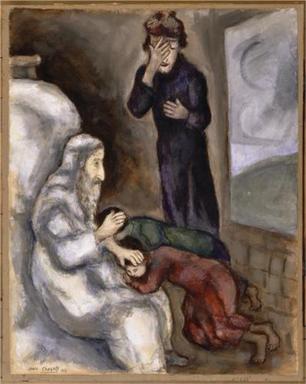It's not a pretty picture. At the beginning of the Jewish story, we see a family caught in a spiral of serial dysfunction, each generation repeating the parental favoritism and brotherly hate of its predecessor. Yet, in this week's Torah portion (Vayechi), Genesis ends with a more hopeful view of how families can overcome their cruel habits and find healing.
Joseph places his two sons in front of his father, Jacob, so that they can receive the old man's blessing. Joseph carefully places the older son, Manasseh, in front of Jacob's right hand for the superior blessing, and he places the younger son, Ephraim, in front of Jacob's left hand. Even after four generations of painful consequences, Joseph is repeating the old habit of playing favorites with his children. What does Jacob do? He crosses his arms to place his right hand on Ephraim's head and his left hand on Manasseh's head.
Joseph tries to correct his father, but Jacob shushes him and says, "I know, my son, I know. He, too, will become a people and will be great. But, his younger brother will be greater and his descendants will be a full nation" (Genesis 48:19). What in previous generations had led to tragedy, Jacob turns into comedy. With his arms crossed and his son confused, Jacob brings the story of Genesis to its conclusion. There is no need to pick favorites and firstborns—both sons become the fathers of great tribes of Israel, neither is excluded.
The same is true, in fact, of all of Jacob's children. Unlike other first-borns of Genesis—Cain, Ishmael and Esau—none of Jacob's sons will be rejected or left out of the family tree. That theme will carry over next week in the first chapter of Exodus when the descendants of Jacob will be called, for the first time in the Torah, Am b'nei Yisrael, "The nation of the children of Israel" (Exodus 1:9). Never again will a child be left out of the nation.
What does this reading of Torah have to say to us, especially those who have suffered from a youth spent in dysfunctional families? The very fact that the Torah acknowledges the existence of families that carry the burden of hurtful, and even malevolent, behavior is helpful. We can find our own stories in the Torah. By showing how one generation can repeat the sins of the previous generation, the Torah gives us insight into human behavior and challenges us to recognize and break the cycles of abuse that each generation inherits.
Most important, I think, is the lesson that birth does not equal destiny. Jacob's crossed arms are a symbol of the overthrow of the law of primogenitor, the rule that gives special privilege to the firstborn. From now own, each person stands or falls on his own merits, not the accident of the circumstances of birth.
That is a lesson that we can carry into our lives today. We continue the lesson of Jacob when we overthrow preferred treatment based on race and gender. Today, we choose to treat our daughters as we treat our sons. There is no special blessing, hope or expectation that we grant only to one sex. In a generation that flourishes with Jews of every color of skin under heaven, we welcome everyone without preferences based on birth.
We can further expand the principle in the way we treat people of different sexual orientations. God makes some people straight and some people gay. Jacob's crossed arms mock the idea that we should honor one more than the other. Torah teaches us not to toss people out of our family tree.
Family dysfunction is as old as the Torah and, of course, older. The Torah should open us to recognize the pain of our pasts, hope for healing, and repair that which was broken.
Other posts on this topic:
Pinchas: Five Sisters Who Turned the Key to Unlock the Torah


 RSS Feed
RSS Feed
